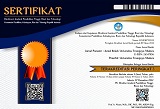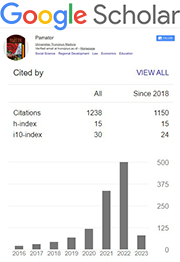Juridical Analysis of the Implementation of Islamic Criminal Law in Aceh from the Perspective of Legal Hermeneutics
Abstract
This study aims to determine the concept of the application of Islamic criminal law in Aceh and to analyze it using the perspective of legal hermeneutics. The research method used is a normative legal research method with statutory approaches (Statute Approach) and case approaches (Case Approach). The study shows that enforcing Islamic criminal law in Aceh is in the context of maintaining the five basic human needs, namely the maintenance of religion, soul, mind, lineage, and property. These five basic needs are necessary for humans. This is determined nothing but to maintain the existence of the five basic human needs, or in other words, the punishments are prescribed solely for the benefit of humans. The current implementation of Islamic law in Aceh is still within the corridor of the trilogy of religious harmony, namely inter-religious harmony, internal religious harmony, and inter-religious harmony with the Government. So if viewed through a hermeneutic lens, Islamic criminal law is basically to achieve harmonious and ideal societal conditions. In implementing Islamic criminal law, the role of all parties is needed, one of which plays an important role is the role of the family. The role is the primary milestone for providing education about Islamic law so as not to become a person who violates Islamic law.
Keywords
Full Text:
PDFReferences
Anifah, and Edi Sukardi, ‘Tanggapn Masyarakat Terhadap Penerapan Hukuman Cambuk Di Daerah Singkil Kabupaten Aceh Singkil’, Jurnal Sekolah, 3 (2019)
Asyhadie, Zaeni, Ilmu Pengantar Hukum (Jakarta: Rajawali Pers, 2016)
Bakar, Ali Abu, and Zulkarnain Lubis, Hukum Jinayat Aceh: Sebuah Pengantar (Jakarta: Kencana, 2019)
Bakri, Asafri Jaya, Konsep Maqashid Syari’ah Menurut Al-Syatibi (Jakarta: Rajawali Pers, 1996)
Djamil, Fathurrahman, Filsafat Hukum Islam (Bagian Pertama) (Jakarta: Logos, 1997)
Gayo, Ahyar Ari, ‘Aspek Hukum Pelaksanaan Qanun Jinayat Di Provinsi Aceh’, Jurnal Penelitian Hukum De Jure, 17.2 (2017)
Hamidi, Jazim, Hermeneutika Hukum (Malang: UB Press, 2011)
Hasan, Mustofa, and Beni Ahmad Saebani, Hukum Pidana Islam Fiqh Jinayah (Bandung: Pustaka Setia, 2013)
Irfan, Nurul, Hukum Pidana Islam (Jakarta: Amzah, 2016)
Irwansyah, Irwansyah, Penelitian Hukum (Yogyakarta: Mirra Buana Media, 2020)
Iskandar, ‘Pelaksanaan Syariat Islam Di Aceh’, Jurnal Serambi Academica, 6.1 (2018)
Mahdi, ‘Sistem Hukum Penegakan Qanun Jinayat Di Aceh’, Jurnal Media Syariah, 13.2 (2011)
Mardani, Mardani, Hukum Acara Jinayat (Jakarta: Kencana, 2022)
Maryandi, Yandi, ‘Gagasan Pemberlakuan Hukum Pidana Islam Di Indonesia’, TAHKIM, Jurnal Peradaban Dan Hukum Islam, 2.1 (2019)
Nurdin, Ridwan, ‘Kedudukan Qanun Jinayat Aceh Dalam Sistem Hukum Pidana Nasional Indonesia’, MIQOT, 13.2 (2018)
Praja, Juhaya S., Filsafat Hukum Islam (Bandung: Remaja Rosdakarya, 1991)
Suratman, and Phillips Dillah, Metode Penelitian Hukum (Bandung: Alfabeta, 2014)
Syarifuddin, Amir, Ushul Fiqih (Jakarta: Logos, 2000)
Tambunan, Frietz R., Dinas Syari`at Islam Propinsi Nangroe Aceh Darussalam, Syari`at Di Wilayah Syari`at Pernik-Pernik Islam Di Nangroe Aceh Darussalam (Banda Aceh: Yayasan Ulul Arham, 2022)
DOI: https://doi.org/10.21107/pamator.v16i1.19274
Refbacks
- There are currently no refbacks.
Copyright (c) 2023 Irma Suryani

This work is licensed under a Creative Commons Attribution-ShareAlike 4.0 International License.
Jurnal Pamator : Jurnal Ilmiah Universitas Trunojoyo by Universitas Trunojoyo Madura is licensed under a Creative Commons Attribution-ShareAlike 4.0 International License.















.png)